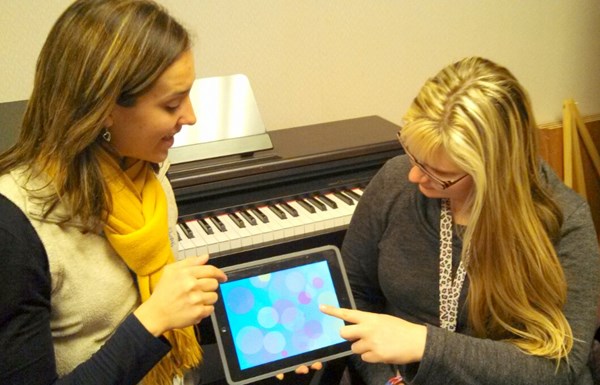CLEVELAND, March 20, 2014 (GLOBE NEWSWIRE) -- From browsing the Web to playing games, reading books, watching movies and listening to music, it's easy to see why the iPad's apps, portability and user-friendly features make it one of today's most popular technological tools. Now, it also plays a therapeutic role in improving the quality of life for thousands of hospice patients.
Hospice of the Western Reserve, one of oldest and largest nonprofit hospice agencies in the United States, has added iPads to the collection of instruments and tools used by its music therapists. The Northern Ohio-based agency employs music therapy as one of several non-pharmacological interventions to help manage symptoms and enhance the quality of life for its patients.
"For our board certified music therapists, iPads open up a wide variety of options for enhancing patient and family experiences and increasing efficiencies in their work," explained Karen Hatfield, team leader for counseling services. "Applications such as Sibelius and Garage Band make it easy for a patient and music therapist to compose, perform and record meaningful legacy or remembrance songs. Relax M. HD is an app that can be used in conjunction with other instruments and guided meditation scripts to create individualized recordings to support patient and caregiver relaxation goals."
Hatfield said Bloom is an app that music therapists have found helpful in supporting the sensory needs of patients with dementia. It allows them to easily create visual and auditory patterns that flow and change with the touch of a finger.
Practical tools, such as Dropbox and Onsong allow therapists to store, catalog and share Hospice of the Western Reserve-owned sheet music that was previously carried from location to location in large, heavy binders. Music therapists can also access YouTube and other Internet sites to respond immediately to patient requests for music that will enhance the visit. Hatfield said the iPads, apps and Internet connectivity were paid for by the "Gift of Music" funds raised by Hospice of the Western Reserve volunteers.
The Northern Ohio based agency's five full-time and three part-time board certified music therapists focus on improving a patient's well-being by managing pain, reducing anxiety, and creating an opportunity for legacy work. Last year alone, Hospice of the Western Reserve music therapists logged over 3,250 visits and worked with more than 750 patients and families.
Dedicated music therapy rooms at the agency's two freestanding hospice houses provide private space to work with patients and their families using drumming, rhythmic entrainment, songwriting and guided imagery. Music therapists also make visits to private residences and nursing facilities when a patient's customized plan of care specifies a need for music therapy.
Through active and receptive music therapy experiences, patients with terminal illnesses can experience improved pain management and reduced anxiety and distress related to the changes resulting from disease progression. In many cases, the music therapist can develop recordings or other tools that can be left with the individual for use outside of the music therapy session. The patient and family can continue to use the recordings to ease recurring symptoms, which is particularly invaluable for home care patients and those living in nursing facilities.
Another important component of music therapy for patients and their families is the opportunity to engage in life review and legacy work. "Recently, one of our patients engaged in the process of sharing the meaning of his life through a mix of recorded songs and messages to his family, who live out of state," Hatfield said. "The day he died, he was surrounded by local friends who asked permission to play the CD that had been created as a result of this work. In the days that followed, his CD was received by his family and subsequently played as part of his memorial service. Our music therapist was honored to have had the privilege of playing a role in this patient's journey."
"We are always looking for new and innovative ways to improve the quality of life for our patients and families," said Bill Finn, Chief Executive Officer. "The use of iPads by our music therapists is just one of many ways technology is enhancing our responsiveness and capabilities. Our Ames Family Hospice House is one of the first facilities of its type to incorporate flat screen TVs, HD video cameras and video calling devices in all patient rooms to allow distant family members to 'virtually visit' with loved ones. We also recently developed a special iRefer app, available through app stores like iTunes, which allows physicians to refer patients to Hospice of the Western Reserve in a matter of minutes."
About Hospice of the Western Reserve
Hospice of the Western Reserve is a nationally acclaimed non-profit agency providing comfort and emotional support to patients and their families. The agency provides palliative end-of-life care, caregiver support and bereavement services throughout the region, and cares for people in a variety of settings, including private residences, assisted living and retirement communities, nursing homes, at Ames Family Hospice House in Westlake and David Simpson Hospice House on Cleveland's east side. For more information, visit hospicewr.org, or call 800.707.8922.
A photo accompanying this release is available at: http://www.globenewswire.com/newsroom/prs/?pkgid=24263
